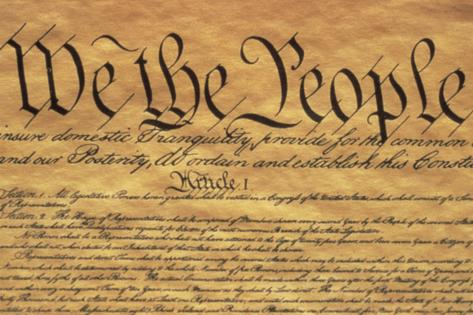God is mentioned in every state constitution but not the US Constitution. Why?
Published in News & Features
A majority of U.S. adults say they believe the U.S. Constitution is inspired by God, but apart from a colloquial expression of the date, there is no mention of a higher being throughout the document.
That’s not the same for the nation’s state constitutions, where there’s at least one reference to God or the divine in each and nearly 200 mentions overall, according to a 2017 Pew Research Center study.
It’s common to find mentions of God in state constitutions’ preambles, but according to the study, a majority of state constitutions refer to God more than once throughout the document.
The Massachusetts Constitution mentions God eight times, and the constitutions in New Hampshire and Vermont mention God six times each, the study found. They also rank among the least religious states in the country, according to a 2016 Pew Research Center analysis.
Why isn’t God mentioned in the U.S. Constitution?
Experts say there are several reasons that might explain why God isn’t mentioned in the federal Constitution.
Jack Rakove, professor of history and American studies at Stanford University, told McClatchy News it starts with James Madison, who played a key role in drafting the Constitution.
Madison believed the more religion is privatized, the better off the country would be, Rakove said, adding that the framers also wanted to prohibit the government from establishing a national religion.
David Bateman, an associate professor of government at Cornell University, told McClatchy News most of the drafters were broadly religious but divided on religion and English traditions.
“It was a lot easier to come up with and agree upon both the language of religion and specific types of religious expression at the state level, where there was less diversity, than at the national level,” Bateman said.
He also said states don’t worry as much about whether or not there’s going to be an establishment of state religion. Since they look to federal rights for protection, there is more flexibility to update the state constitution if needed.
But despite the overhaul of other aspects of state constitutions, especially in recent years, mentions of God or a higher being have remained.
Steven Green, who teaches courses on constitutional law and American religious history at Willamette University, told McClatchy News he thinks that’s because these references to God don’t have any legal weight.
“Why stick your neck out? Why have a newspaper immediately report you as being anti-God because you are a legislator and you want to take God out of the constitution?” he said.
What does the Constitution say about religion?
Fifty-five percent of U.S. adults believe the Constitution was inspired by God, according to a 2022 Deseret News and Marist poll.
While God is referenced in the Declaration of Independence and the Pledge of Allegiance and appears on U.S. currency, the most religion is mentioned in the Constitution is in the First Amendment. It prohibits Congress from establishing an official religion and protects the right of citizens to practice their faith.
“You see nothing in the notes of the constitutional convention that make any references to the authority for government coming from God. It’s ‘we the people,’” Green said.
Bateman said Americans’ belief that the Constitution is divinely inspired speaks to society’s high religiosity and politically constructed reverence for the document.
‘Renewed interest’ in religion and politics
Political scientist and statistician Ryan Burge told McClatchy News he’s seeing a “renewed interest” in trying to find religious understanding and justification for positions on social issues.
“That’s leading people to try to trace back this interaction between religion and politics in American culture over the last 250 years,” he said.
According to a September Google Trends report, the question “is god mentioned in the constitution” tripled in search in 2024, with some the top areas where the question is being searched falling in swing states.
The spike in searches may speak to the country’s political engagement, especially in an election year, Burge said.
Burge also explained that people in swing states have a harder time being politically disengaged as they’re more likely to be seeing political ads at higher levels.
“This is exactly what we want elections to do, by the way, from a political science perspective. We want people to be prompted by the election to think about government,” he said.
_____
©2024 The Charlotte Observer. Visit charlotteobserver.com. Distributed by Tribune Content Agency, LLC.







Comments